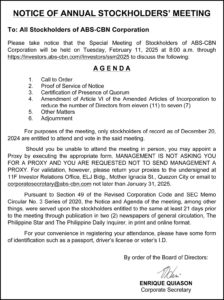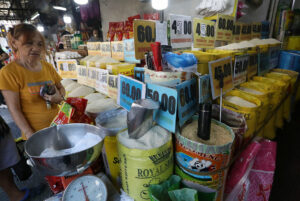WEAKER international rice prices could cause the proposed price ceiling on imported rice to be set lower, the Department of Agriculture (DA) said on Monday.
“The maximum suggested retail price (MSRP) for imported rice… most likely, in the coming days will further go down,” Agriculture Assistant Secretary and Spokesperson Arnel V. de Mesa said in a briefing.
The DA had set the MSRP at P58 per kilogram for imported rice with broken-grain content of 5%. A price ceiling has not yet set for imported 25% broken rice. The price ceiling is expected to take effect on Jan. 20, initially in Metro Manila.
He estimated an MSRP for 25% broken rice of below P50 per kilo.
Last week, the DA announced plans to set an MSRP for imported rice to further lower rice prices and curb profiteering from rice traders.
It also set labeling rules for imported rice identifying country of origin, type, and broken-grain content. The DA had noted that prices of some imported rice brands remained elevated despite lower import tariffs.
President Ferdinand R. Marcos, Jr. last year issued Executive Order No. 62 which slashed tariffs on rice imports to 15% from 35% previously until 2028.
The lower tariff rates on rice, which took effect on July 5, were intended to bring down prices and curb inflation.
The Philippines imported a record 4.78 million metric tons (MT) of rice in 2024, according to the Bureau of Plant Industry (BPI).
Mr. De Mesa said that there was an upward revision of the 2024 data due to “delayed counting.” Last week, the BPI reported rice imports of 4.68 million MT.
The BPI had issued 9,795 sanitary and phytosanitary import certificates (SPSIC) last year, equivalent to about 9.37 million MT of rice. Utilization by rice importers was about 66.13% or 6,477 SPSICs used.
He added that not all issued SPSICs will be fully utilized by rice traders due to factors like delayed shipping and transactions.
“There are applications which were not acted upon by the BPI, after seven days they will be deemed approved,” Mr. De Mesa said.
He added that international rice prices have declined, setting the tone for domestic rice prices.
Citing data from Vietnam as of Jan. 10, he added that the price of 5% broken rice dropped to $434 per MT from $510 per as of Dec. 10, while 25% broken rice fetched $409 per MT, down from $454.
According to DA price monitors, as of Jan. 10, a kilogram of imported special rice in Metro Manila markets sold for between P53 and P65 per kilo, while imported premium rice fetched between P52 and P60 per kilo.
The Philippines remains the world’s top importer of rice, according to the USDA. The Philippines is projected to import 5.3 million MT of rice in 2025. — Adrian H. Halili


















